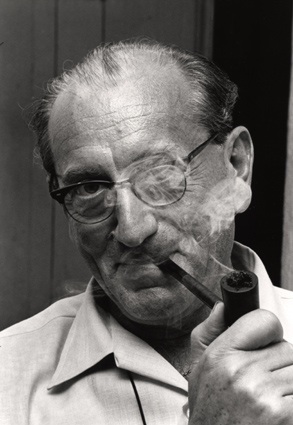Andor Kraszna-Krausz
“One’s own past is a mere continuation and extension of the past of others. One is only a link in a chain, never a complete beginning nor – let us hope – the end of it all”
Andor Kraszna-Krausz, 1979
Andor Kraszna-Krausz (1904 – 1989) was born in Szombathely, Hungary on 12 January 1904. After studying photography and cinematography at Munich University, KK (as he was known to his friends) began his publishing career in Germany in 1925 as the editor of Filmtechnik magazine. In 1937 he came to Britain as a refugee and a year later founded Focal Press, an influential specialist publishing house for books on photography. Focal Press publications were an immediate success, gaining a reputation for clear yet authoritative text and illustrations. During KK’s lifetime Focal Press published 1,200 books. It is now the world’s leading publisher of books about photography, film and television.
Little is known of his early years, except that he was a gifted amateur photographer at the age of 12. he enrolled in the Department of Theatre Studies and Cinema Technology at the Technical Institute in Munich. Later he began writing letters on film as the Berlin correspondent for the avant garde journal Close Up: A magazine devoted to the art of films. In 1923 he moved to Munich University to pursue his interests at the school of photography and cinematography. In Munich he came into contact with the publisher Wilhelm Knapp, who had read his critical writing on film and who invited KK to edit the new magazine Filmtechnik in 1926. This became the leading moving picture trade paper and KK edited it until 1936.
Kraszna-Krausz came to England in 1937 and the following year founded Focal Press with its lower case ‘f’ (taken from the f/aperture symbol) as its colophon. The key to an almost immediate success was his creation of a style in publishing that placed a priority on clarity of explanation – not only in words, but in clear line illustrations that were easy to understand. His aim, and his outstanding achievement, was to make photography comprehensible to the masses at a time when the expert use of the still camera was still shrouded in technical mystery for the general public. One of the earliest books from the press, The All-in-One Camera Book by E Emanuel and W D Dash, taught the amateur the principles and practice of good photography; it sold over a million copies and went into 81 editions. This book also established the Focal Press style of simple, unambiguous text and illustration.
In the early 1940s KK began to publish large-format picture books on 19th century photography. These featured works by William Henry Fox Talbot, David Octavius Hill, Julia Margaret Cameron, Roger Fenton, Frank Sutcliffe and others, selected from the permanent collection of the Royal Photographic Society by Alex Strasser with commentaries by Kraszna-Krausz. Unusually for the time, these books reproduced original prints and KK’s accompanying essays described their relationship to the history of photography.
His dedication to the audio-visual media meant that Focal Press published many serious, even erudite, works of importance to professional practitioners and image technology scientists. The innovative series Progress in Photography and the unique Focal Encyclopedia of Photography covered the field comprehensively, both in academic and practical terms. It is to pursue that vision that the Foundation’s Awards and Grants are given.
Six years before his death, he set up the Kraszna-Krausz Foundation and donated his valuable collection of books on photography and the audio-visual media to the National Museum of Photography, Film & Television in Bradford where there is now a reading room in his name.
During KK’s life he published 1,200 books on the camera arts all over the world, marketing an astonishing 50 million books. His work was everything to him and it was to his work, and to the continued pursuance of his vision, that he left his estate.
